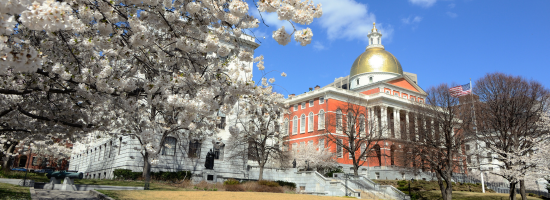Gateway City and creative leaders are eagerly awaiting the Healey-Driscoll administration’s FY 2026 capital budget. An appropriation to the Downtown Vitality Fund is the last step necessary to achieve a much-needed tool that they have been working together to create for more than four years.
Last month, a governor-appointed advisory council recently recommended expanding support for downtowns even as the state’s only downtown program fought to survive a difficult budget process.
A principal action item in the Cultural Economy Advisory Council’s report, which seeks to better integrate the arts and cultural sector with economic development initiatives, recommended including the Downtown Vitality Fund in the Healey-Driscoll capital investment plan (CIP), which is expected to be released within the next few weeks.
Although the Legislature and Governor authorized $9.5 million for a downtown vitality program in last year’s economic development bond bill (the Mass LEADS Act), The Governor has the final say on whether it is included in the actual state capital budget and at what level.
The MassINC Policy Center, along with other organizations, including MassCreative, the Massachusetts Cultural Council, the Metropolitan Area Planning Council, and the Massachusetts Association of Business Improvement Districts, asked state leaders to appropriate a modest $500,000 in the CIP to stand up the program, enough to accelerate adoption of district management tools for 8 to10 downtowns and put them on the path to self-sufficiency.
As the federal government retrenches and tariff policies unsettle small businesses, it’s the right time to inoculate our local economies from uncertainty. Strengthening business districts like downtowns and main streets will help make our communities more resilient in a number of ways, including:
- Creating meaningful jobs for local residents;
- Contributing to a diversified tax base with the decision to grow or close made at the local level rather than at a national office;
- Supporting community investments and sponsorships;
- Sourcing products from regional supply chains, which helps create jobs in other local businesses and recirculates money in the community through a multiplier effect;
- Offering unique products, experiences, and services, many of which enhance the community’s culture and identity; and
- Mitigating the negative impacts of downturns, since local business owners live nearby, care about their neighbors and quality of life, and may be more inclined to “hang tough” through challenging times.
The Downtown Vitality Fund will provide communities with the state partnership they need to cultivate places that attract visitors, investments, and jobs. The missing ingredient for many Gateway Cities and other communities has been the organizational capacity to adopt district management tools such as business improvement districts, cultural districts, district improvement financing (DIF), parking benefit districts, and other kinds of local economic partnerships.
In our 2024 report District Management for Downtown Vitality, the MassINC Policy Center demonstrated how a modest Downtown Vitality Fund could unlock millions of local public and private dollars by supporting the outreach and know-how to develop sustainable funding streams and governance structures.
The commonwealth appears to have only one economic development program that explicitly supports local commercial districts: the Massachusetts Downtown Initiative (MDI), funded by a $600,000 line item out of the Executive Office of Economic Development (EOED). At this meager level of support, the program can provide technical assistance for fewer than two dozen commercial areas each year, spread across a range of issues such as branding, marketing, signage, market analysis, parking, and other studies.
Yet even that amount of funding appears threatened. The House eliminated MDI’s funding in its FY26 budget, and only Sen. Pavel Payano’s budget amendment ensured that the Senate included it in theirs.
A capitalized Downtown Vitality Fund would not only make MDI a more impactful program, but it would also provide a path to long-term sustainability for many of MassDevelopment’s Transformative Development Initiative communities, the Massachusetts Cultural Council’s cultural districts, and other Main Streets-type organizations holding on by the skin of their teeth.
Downtowns desperately need the capacity to develop their economic and cultural assets and create an environment in which small businesses can thrive.
While the federal government retreats and tariff policies unsettle small businesses, now is exactly the right time for the state to make strategic investments that can stabilize and grow our local economies.
